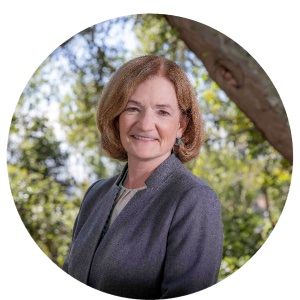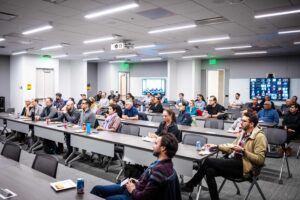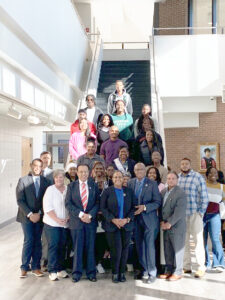Message from Carol

Dear Colleagues:
We take very seriously our role in developing the next generation of scientists and engineers at the Lab and beyond. In this issue of Research News, we share some of the many efforts at the Lab to ensure we maintain a talented workforce at the Lab, now and in the future. You will read about some of the work being done at the division level and through the Director’s Stewardship Summit, one of our leadership training and development programs.
We are also committed to inclusion, diversity, equity, and accountability (IDEA) and to helping build a scientific workforce that embodies these values. You will read about how some of our colleagues are working to increase diversity in physics and participating in our Lab Ambassador program to reach out to underrepresented STEM communities.
In order to meet these needs, we support hands-on training for the next generation of STEM professionals. Our internship programs, managed by the Workforce Development and Education (WD&E) Office, have helped to train hundreds of young scientists over the years. We partner with other institutions through programs such as Reaching a New Energy Sciences Workforce (RENEW) and Funding for Accelerated, Inclusive Research (FAIR). The UC Davis-Berkeley Lab Faculty Fellows is an example of a collaboration incorporating research experiences for graduate and undergraduate microbiology and soil science students in labs at both campuses.
Thank you to all of you who have contributed your time and effort to developing a scientific workforce that will help solve our world’s most pressing problems.
Sincerely,
Carol Burns
Deputy Laboratory Director for Research
Chief Research Officer

Working to Increase Diversity in the Physical Sciences
According to the American Physical Society (APS), today only 21% of physics PhDs are awarded to women. The numbers are even more disappointing for underrepresented minorities, who account for only 10% of physics PhDs. The Advanced Light Source’s Hendrik Ohldag and National Energy Research Scientific Computing Center’s Lipi Gupta are working with the American Physical Society to improve diversity in the field.

Building the Next Generation of Berkeley Lab Science and Engineering Leaders
Berkeley Lab’s long-standing scientific leadership is due in large part to thoughtful planning around talent development and execution of these plans. In addition to the ongoing work by Human Resources and the Lab Directorate, our research areas and divisions are focused on this critical issue. Research News spoke with the Energy Geosciences Division’s Jens Birkholzer, the Engineering Division’s Henrik von der Lippe, and Principal HR Division Partner for the Joint Genome Institute Tina Clarke about how divisions are working to ensure a strong next generation of researchers and engineers.

Stewardship Summit: Leveling Up Leadership Skills at the Lab
In January, 174 emerging and experienced managers and leaders from across the Lab participated in a hybrid, multi-part leadership and management program led by the Lab’s Learning & Culture Office. Research News spoke with Aditi Chakravarty, the Lab’s Chief Culture Officer, and some of the program participants: the Molecular Foundry’s Kristen Granados, Biosciences Area’s Héctor García Martín, and Energy Technologies Area’s Anna Spurlock.
Hear what they had to say about the program and what they took away from it.

Berkeley Lab Ambassadors on DOE’s Fostering Great Minds and Great Ideas Tour
From October 2023 to March 2024, DOE’s Office of Science arranged a tour called “Fostering Great Minds and Great Ideas.” Selected participants visited thirteen minority serving institutions (MSIs) and two user facilities, meeting with university leadership, faculty, and students across STEM fields. Four Berkeley Lab Ambassadors accompanied Talent Outreach Program Manager Kelly Johnson as well as Office of Science leadership and representatives from all national labs on these visits. Among the Lab Ambassadors from Berkeley Lab were Andrew Jones (EESA), Vivek Mutalik (BSA), Emiley Eloe-Fadrosh (BSA), and Ken Williams (EESA).
Read about their experiences and thoughts about these visits and their value for the Lab’s mission.
NEED TO KNOW
Intellectual Property Training to Launch this Spring
Invention and software disclosures are a priority for the Lab and the DOE. Disclosing intellectual property is part of our stewardship of publicly-funded research. Also, the DOE stipulates that all intellectual property, such as inventions and software, developed by Berkeley Lab employees as part of their jobs at the Lab or developed using Berkeley Lab facilities, resources, or research funds, is owned by The Regents of the University of California and should be disclosed to the Lab’s Intellectual Property Office (IPO).
IPO and the Office of the Deputy Lab Director of Research are launching a mandatory training video this spring to explain the benefits and responsibilities of disclosing inventions and software. The training, titled “IPO 0010, Invention and Software IP: Your Benefits and Responsibilities,” will be required of all research and division staff. This training will be launched in the coming weeks.
Keep an eye out for an email about the training requirement. If you have any questions, please contact ipo@lbl.gov.
Keeping Track of Your Chemicals: Site-Wide Chemical Inventory Reconciliation Wraps Up in May
Having an accurate chemical inventory at the Lab is crucial for safety and science. A site-wide effort to reconcile the differences between the physical inventory of hazardous chemicals in labs with records in the Chemical Management System (CMS) database has been in progress since August 2023 and is scheduled to be completed by the end of May. This round implements a new process using radio frequency identification (RFID) tracking and integration with CMS to improve accuracy, efficiency, and safety. The last time site-wide chemical reconciliation was performed was in 2019. Going forward, each lab with hazardous chemicals is required to perform reconciliation on a two-year cycle.
The chemical owner (usually a PI or technical area supervisor) is ultimately responsible and accountable for maintaining an accurate inventory, which means ensuring all hazardous materials are tracked accurately in CMS and deleted from CMS when the materials have been used up, disposed of, or taken off-site. Facilitating proper storage and mitigation of hazards such as time-sensitive chemical management are also key responsibilities. See the Chemical Lifecycle Stewardship page for more information and resources.
Deadline to Submit for the 2024 Berkeley Lab Research SLAM is June 14
Early-career scientists and postdocs who want to participate in this year’s Berkeley Lab Research SLAM competition in September must submit their intent to participate by Friday, June 14. SLAM contestants give a compelling three-minute presentation of their research before an audience and in language that’s accessible to non-specialists. First-prize is $3000, and contestants gain valuable presentation experience.
Visit the SLAM website for more information.

